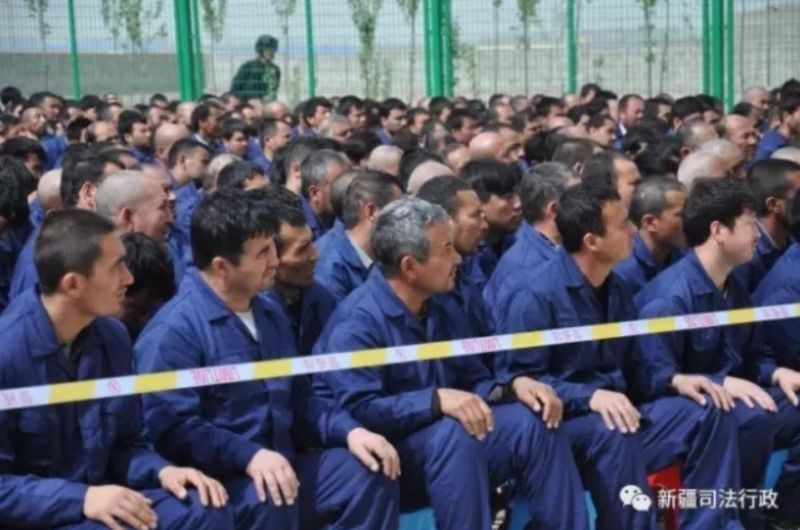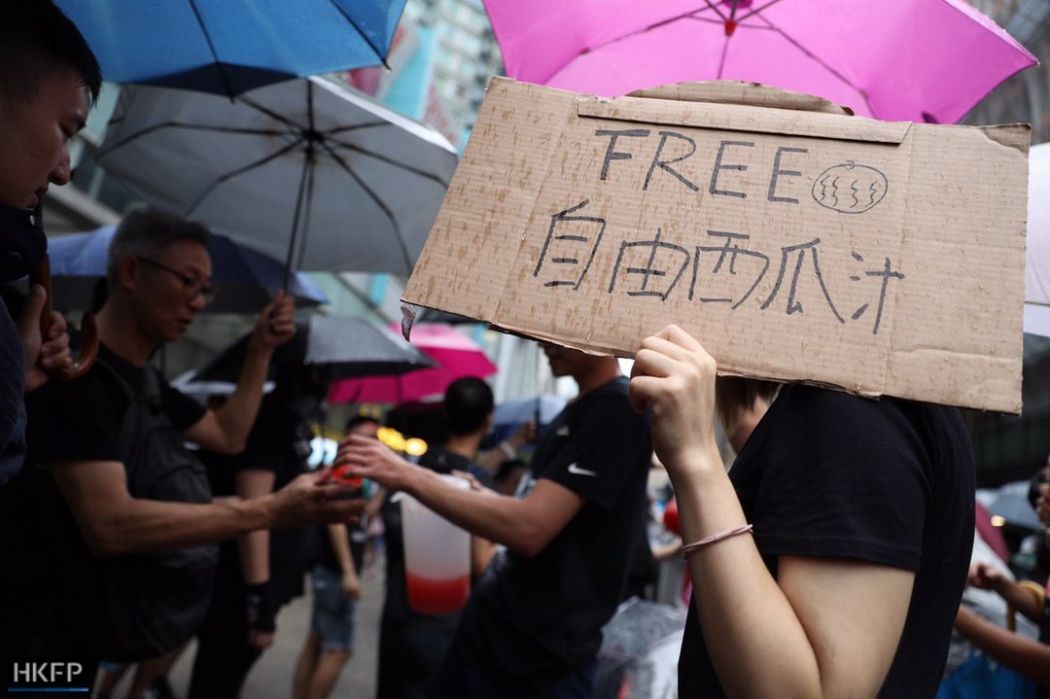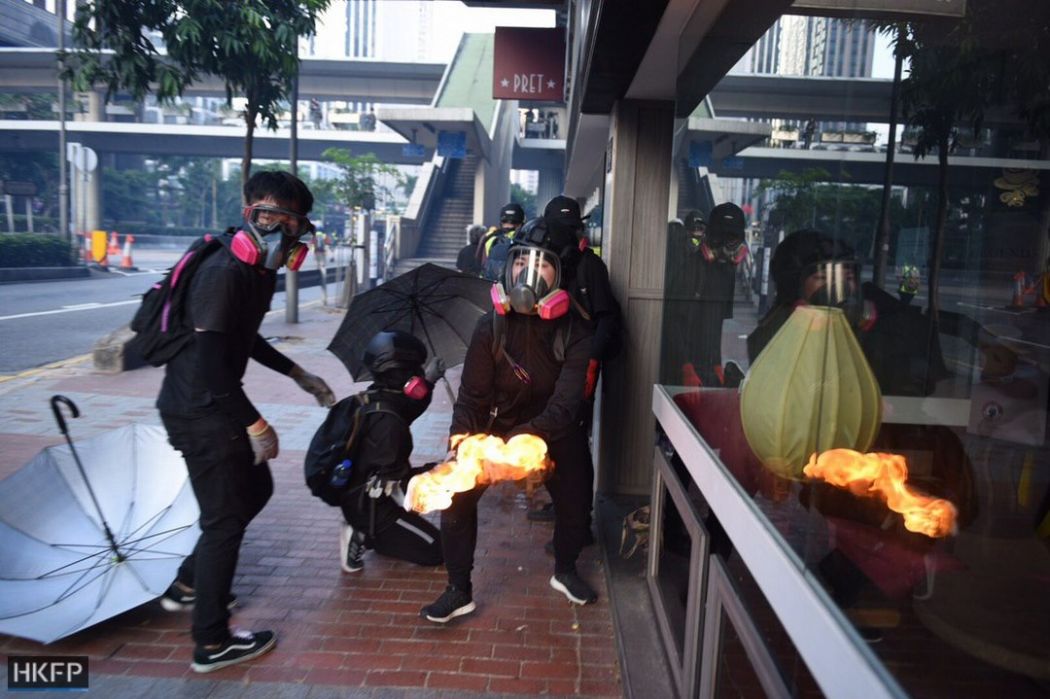By Joseph Woodard
You should be scared of what Hong Kong’s radical protesters might do. I’m shocked at all the trash fires, spray paint and even Molotov cocktails.
I’m scared of how radical protesters may undermine the democratic movement. I’m scared because I live in Hong Kong and I don’t have any plans to leave here.
But you should be scared of what China will do if the protest movement is unsuccessful. No matter where you live, your freedoms will suffer too.

How do I know? Because I watched foreign politicians and business leaders indicate support for Hong Kong and then shut up when it became politically or financially uncomfortable. As they continue to kowtow to China’s censors, your nation’s legal and economic policies (no matter where you live) will quietly and harmoniously conform to China’s requests for self-censorship. The NBA will not be the last company, or the largest, to bow down to Beijing.
The Hong Kong protests are still massively popular. But there’s a growing number of radical protesters who believe that the world no longer cares about them. I wish that they would all only articulate their concerns as clearly and peacefully as the world would like to hear. And I wish the world would pay attention, even when there’s no blood or fire on our streets.
But in a thousand different forms, ranging from peaceful to pushy to violent, this is what Hong Kong protesters are saying: “We know what China is like, and we can’t turn into that.”
I love China. Honestly, there’s so much to like. And I don’t want to be that guy who hates on mainland China. My Hong Kong friends and relatives probably think I’m crazy for saying this, but I would still be happy to live there.
But after two years of the daily hassles of censorship, and frustration at the injustices nobody could discuss, I moved to Hong Kong. Because Hong Kong is free.

When I moved here, China was still saying that Hong Kong would be allowed fully democratic elections. Since the 1980s, China had promised the world that Hong Kong would retain their autonomy and legal structures until 2047 — or longer if needed.
But since Xi Jinping became China’s president in 2012, a lot has changed, hasn’t it?
Why I agree with Hong Kong’s protest movement
Until recently, Hong Kong people weren’t willing to discuss China’s problems openly. Like the rest of the world, we all went along with the (now debunked) notion that China would become freer as it advanced economically. Instead, China’s freedoms of speech, assembly and religious belief have all deteriorated significantly since Xi Jinping began ruling. Across the board, Chinese people have more wealth, and significantly less freedom, than they did in 2012.
Now, Hong Kong people can see how close they are to losing their liberties. That’s why they won’t stop yelling until they get full democracy.
I’ve followed China’s treatment of Christians for many years. The persecution went in cycles, depending on the region, holiday, etc. But during the past 20 years or so, it was never uniformly, shockingly horrific across the entire nation.

That’s changing. Last April, the Great Firewall entirely removed the Bible from the internet. Last September, Pope Francis formally handed over leadership of China’s Catholic churches to the government. Now, the Religious Affairs Bureau is coordinating a state-approved translation of the Bible. And they are continuing to execute a carefully planned strategy to shut down all private religious meetings.
On a more personal note, Pastor Wang Yi, whom I freely met at his church in 2015, was arrested last year in Chengdu. Over 200 of his church members were arrested, including children.
Let me tell you what I saw in 2015. A friend had invited me there at the last minute, and I joined a conference session. Hundreds of young adults had gathered to discuss the theme of marrying Christian education with the best of Chinese classical education. It was a beautiful idea.
But children are not allowed to receive any religious instruction or attend any religious events in mainland China. And besides running a house church, Pastor Wang Yi has also publicly spoken about the 1989 Tiananmen Square protests. Nobody knows where he is.
Hong Kong’s Christian pastors want peace. But many of them are supporting the protests because they don’t want to see people lose their freedoms or get disappeared. Since this is the freest city in China, they also feel an obligation to use their freedom to support the churches in mainland China. This is becoming more difficult. Under current law, Hong Kong pastors can be banned from the mainland for helping house churches. In the future, they could be imprisoned in Hong Kong.
And then, there’s China’s Uyghur population. I can’t contact my two Uyghur friends directly because whenever they communicate with the outside world, they are interrogated.

These are educated, law-abiding Chinese citizens. One is fluent in five languages and the other in seven. Last time I saw them, a few years ago, they said they’d really love to visit Hong Kong.
And I wish I could have invited them to my wedding here. But they have no chance of getting the travel documents they’d need for a trip to Hong Kong.
Because they’re Uyghurs, they can’t get passports to travel to other countries. They can’t even check into hotels in China. Under China’s new social credit system, their ethnicity is a hurdle that’s nearly impossible to overcome. And they have to keep a low profile so that they don’t join everybody else in Xinjiang’s training centers.
Practically speaking, millions of people in mainland China are imprisoned, without even being in prison.
Hong Kong on the frontline of freedom from authoritarian rule
I don’t think we can rely on Donald Trump or other world leaders to solve this. But if individual politicians and business leaders continue to stand up for Hong Kong, it will have a positive snowball effect. So I’m asking foreigners to use their influence to speak up. Please get the ball rolling.
If China backs off Hong Kong and keeps its promises about democracy and free speech, then we don’t have to watch our freedoms and rights slowly disappear every year until we get old or leave Hong Kong. If we win, we can remain free.
And, yay for Hong Kong, right?

But let’s say China doesn’t back off Hong Kong. Right now, we are the only place in China with the freedom to show the world exactly what’s going on here. The reporters aren’t getting kicked out or imprisoned. You can still watch ongoing coverage of the protests. And you can still communicate with us freely. But if the world chooses to ignore us, we will lose. And if we lose in broad daylight because there aren’t enough people standing in solidarity with us, then does any other society have a chance at becoming free? No.
Boo for everybody.
Gambling with China
Whether we like it or not, the protests will not stop until China chooses either 1) to make good on their promises for democracy, or 2) cracks down on every aspect of life in Hong Kong.
The protesters — both the peaceful majority and the radical demonstrators — have gambled the future of Hong Kong. They are not bluffing, and they could lose.
But I remember another gamble, made by the American presidents in the 1990s. They persuaded us that by lifting economic sanctions, playing nice and granting most-favored-nation status, China would naturally open up to democracy and human rights. This was a gamble that we lost.
There’s also another kind of gamble. Some researchers looked into how China responds to “foreign meddling” in Xinjiang. Most people assume the government will retaliate if anyone publicizes the persecution of friends or relatives in China. And that happens. But some people take the risk. And Chinese authorities often cave in when foreigners pressure them on individual cases. It’s a risk worth taking if enough people are willing to take it.
China will respond to ongoing, targeted international pressure. So don’t be afraid of tanks rolling down the streets of Hong Kong. Be afraid of international figures doing business as usual with China, as Hong Kong protesters are imprisoned, fired, kicked out of school and slowly silenced into submission or suicide.

Hong Kong is the most public line of defense against Chinese authoritarianism. You can’t get on YouTube and watch live video of the Uyghurs, or the Tibetans, or the victims of institutional organ trafficking. But you can watch what’s happening in Hong Kong, and you can still visit here.
And even if you’re someone who hates the protests, you should still hope they’re successful.
To those angry at protesters for shutting down traffic and hurting the economy
I know you just want things to return back to normal. I know you want peace after months of chaos. I know you’re worried about radical protesters attacking police and destroying things. You should ask them to stop.
Because they won’t see your Facebook posts or South China Morning Post editorials. And they won’t stop protesting until they see movement toward democratic reforms, and independent investigations into police violence. (Or until the prisons are full.)
But in the meantime, the violence must stop. And if you’re willing to talk to them, they might listen to you. That’s what I did.
At the National Day protest, I saw people filling up water balloons and breaking bricks into small pieces. And I talked with them. I asked questions and listened. And then I urged them not to throw anything at the police.
I don’t know what those individual people did in the end, but I know they heard me.

Tonight I was in Sheung Shui. I heard shouting nearby, so I looked for the protest. A hundred people were on the street, and some guys took turns trying to throw a water bottle up at a third-story apartment window. Why? The resident had thrown water from his window at the protesters, and a couple of people got wet.
The small group of guys were looking for a way to retaliate. It slowly escalated until I was worried they might try to break into the man’s apartment.
So this is what I did. First, before I even went out, I put on a black T-shirt. (And you might want to carry along a pair of goggles — it shows solidarity. Also, tear gas can float a long way, and it stings.)
I chatted with people in different parts of the crowd to figure out what was going on.
I made my way toward the guys who were throwing the water bottle and shining a bright light up at the window. Basically, I told them, “Gosh, that guy is stupid. Why would he throw water? He’s SO stupid!”
The guy who was shining the bright light at the window told me that he wanted to set the apartment on fire. It wasn’t clear whether he was joking. So I reached out to him, touched his shoulder and lowered my voice a bit: “He’s stupid. You’re not stupid. Right?” He didn’t really respond, but he left soon after that.
Then I talked with a few other people nearby. One young woman was so frustrated that the world seems to have abandoned them and that even her foreign business colleagues don’t seem to care.
Let’s say I hadn’t cared enough to step outside and talk to them. That dumb, petty, little incident could have become another news headline about mob violence, or police brutality. But it didn’t. Not because I’m a foreigner but because I listened before trying to intervene.

I’m on their side and I want them to win. I also strongly oppose violence. But I don’t have any way to stop the violence if I completely “cut the mat” (a Chinese idiom meaning to distance yourself from someone).
Dialogue with protesters requires meeting them and talking to them
If you want the madness to end, go chat with the protesters. It’s really not as scary as it sounds. And you’ll learn things that are impossible to understand from watching the news.
For example, you’ll learn that even the protesters who look like wild-eyed radicals are probably thoughtful enough to have a conversation with you. So I urge you, go out to the street and meet them. The future of Hong Kong depends on your ability to reach out to people you disagree with, and to listen to them.
And if you’re a radical, violent protester reading this … can we please talk? You don’t have to throw things at the police to make your voice heard. And I’ll do everything I can to make sure the world can hear you.
Joseph Woodard is an author, speaker, and language enthusiast living in Hong Kong. His works include How to Fail at Cantonese: a Beginner’s Guide. A version of this article appeared on ucanews.org.
